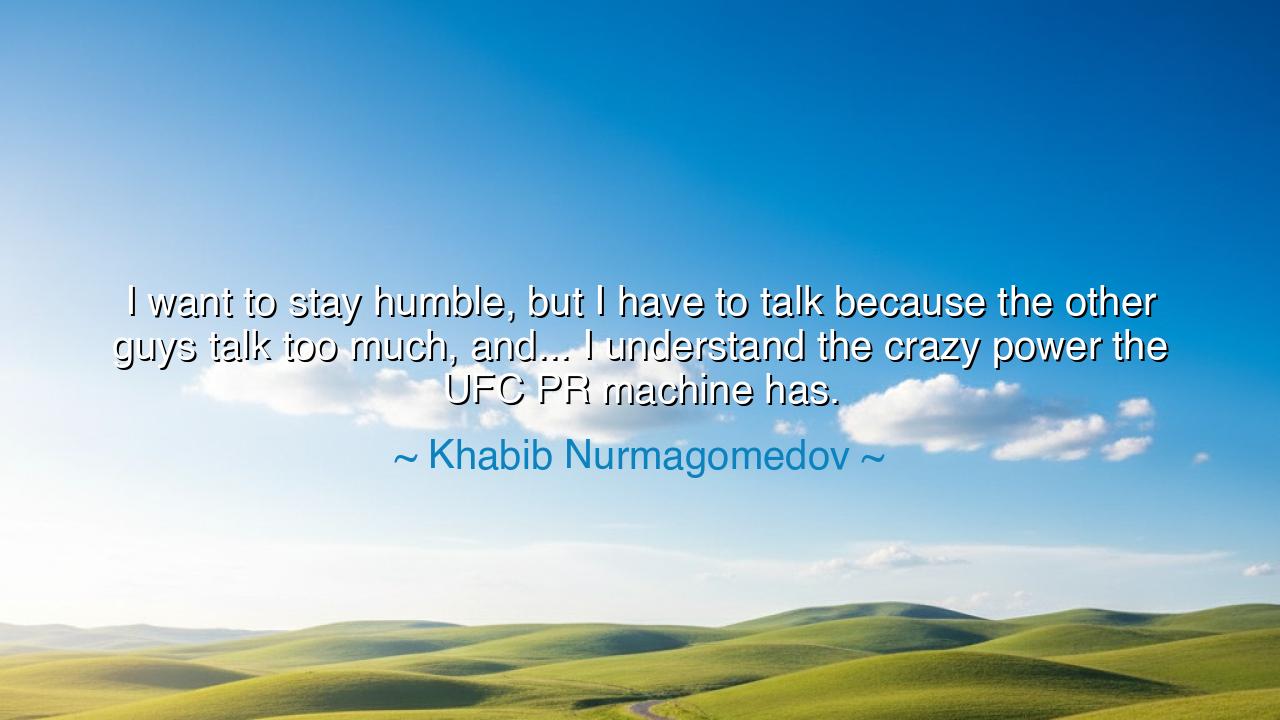
I want to stay humble, but I have to talk because the other guys
I want to stay humble, but I have to talk because the other guys talk too much, and... I understand the crazy power the UFC PR machine has.






The warrior of the octagon, Khabib Nurmagomedov, once declared: “I want to stay humble, but I have to talk because the other guys talk too much, and... I understand the crazy power the UFC PR machine has.” In these words he unveils the tension between humility and power, between silence that preserves dignity and speech that wins influence. He shows that in an age of spectacle, even the man who desires stillness must sometimes raise his voice, lest his truth be drowned by the roar of others.
The origin of this wisdom lies in Khabib’s own journey. A fighter forged in discipline, trained in the mountains of Dagestan, he cherished humility, knowing that boasting dishonors the warrior’s path. Yet in the world of the UFC, where rivals built empires of attention with taunts and words, he saw the machinery of public relations—a force that could lift a man to glory or bury him in obscurity. Thus he learned that even the humble must speak when silence would mean defeat not in combat, but in perception.
History bears witness to this same struggle. Marcus Aurelius, emperor and philosopher, longed for a life of quiet thought, but duty compelled him to speak and rule amidst the noise of empire. He wrote in his Meditations not to boast, but to remind himself of the necessity of balance: to be strong without arrogance, to be visible without vanity. Like Khabib, he knew that silence alone could not preserve power, for the world listens most to those who dare to speak.
The ancients also saw the danger of unchecked voices. In Athens, demagogues rose not by wisdom but by noise, swaying the crowd with words rather than deeds. Socrates himself fell victim to such clamor, condemned not for guilt but because others spoke louder. From this, too, we learn Khabib’s truth: that silence may be noble, but when falsehoods ring out, the just must answer.
Therefore, O seekers, take this lesson: guard your humility, but do not mistake it for silence at all costs. When the world is filled with empty voices, your voice must rise—not to boast, but to anchor truth amidst noise. Understand, as Khabib did, the power of words and the machinery that multiplies them. Use that power wisely, neither in vanity nor in fear, but in strength and purpose. For the warrior’s honor is not only in the strike of his hand, but in the clarity of his speech when the world demands it.






HAThieu Hoai An
This statement makes me reflect on the influence of organizational power on individual behavior. How does UFC’s PR machinery shape the conduct and voice of fighters like Khabib? Is there a risk that excessive media engagement can overshadow athletic performance or distort public perception? I’m curious how athletes reconcile personal values with the commercial realities of high-profile sports, and whether fans understand the pressures behind public statements.
MTMai Trang
I feel this quote reveals the intersection of strategy, psychology, and public perception. How much of Khabib’s communication is driven by tactical considerations versus genuine expression? Does speaking in response to others talking too much reflect a need to control the narrative, or is it simply unavoidable in a media-heavy sport? I also wonder whether this struggle between humility and promotion affects mental focus and performance inside the octagon.
GBNguyen Ngo Gia Bao
This quote raises questions about authenticity in professional sports. Can an athlete truly stay humble when the system rewards bold statements and self-promotion? How do external pressures, like PR teams and fan expectations, influence behavior that may feel unnatural to the individual? I’m interested in exploring how public figures negotiate the line between personal values and professional necessities, and what strategies allow them to stay true to themselves.
THThien Hoang
Reading this, I’m struck by the role of media and promotion in shaping modern sports. Does Khabib’s acknowledgment of the ‘crazy power’ of the PR machine suggest that even top athletes must navigate marketing pressures carefully? How does one maintain credibility and integrity while still engaging fans and sponsors? I wonder if this dynamic creates stress or ethical dilemmas for fighters who prefer humility but must compete in a high-visibility industry.
ABAnh Bui
I find this perspective intriguing because it highlights the strategic aspect of communication in sports. If Khabib feels compelled to speak due to others talking too much, does that mean he sees silence as a disadvantage? How does the competitive environment, both in and out of the octagon, shape the way fighters present themselves? I’m curious whether other athletes face similar conflicts between staying humble and participating in media narratives.